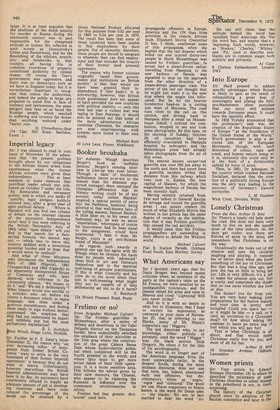Imperial legacy
Sir: I was pleased to read in your issue of November 25 the admission that 'the present problem brought about by our obligations to the African Asians arises from carelessness when the former African colonies were given their independence . . . ' This at least expiates in some • measure that . pontifical leader which you published on October 7 under the title, ' An honourable and necessary action,' and in which you spoke of specific, legal pledges, publicly entered into, after a great deal of open political debate. . . ' Where in Hansard will you find one column of debate on the relevant clauses of the successive Independence Acts? And if you were referring to the British Nationality Acts of 1964, what 'open debate' will you find in that search for a facesaving formula, the easiest way out, — which was to leave this country saddled with a monstrous potential burden and to hope that it•would never be realised?
And what of those Ministers who introduced the Independence Bills of 1960 (Nigeria), 1961 (Tanganyika) and 1962 (Uganda) to an apparently disinterested House of Commons and who later declared, with reference to the citizenship clauses, 'We meant to do it' and 'We did it deliberately '? What honour would you ascribe to a, solicitor who set before his clients a document which, in vague language, laid them under a grievous encumbrance, and finding
• them ready to sign without demur, suppressed the suspicion that they had not understood its import and withheld any but the most perfunctory explanation?
/rest Winch, Kings Lynn, Norfolk.
Sir: Further to F. E. Isaac's letter (December 2), the reason why 'an ever increasing influx' of immigrants from former British Colonies 'want to settle in the very homeland of their former Imperial oppressors' is because they do not want to starve. Unfortunately, however marvellous the British Imperial administration may have been in its day, its successors have consistently refused to supply an adequate amount of aid to developing countries and have even reduced the percentage of the dends can be obtained by a
Gross National Product allocated for this purpose from 0.52 per cent in 1960 to 0.34 per cent in 1970. The result has been that some of those countries have been unable to find employment for their people. Out of necessity, therefore, those people are forced to emigrate to wherever they can find employment and that includes the country of their former (and present) oppressors.
The reason why former colonies originally 'based their governments and institutions on British models' is that they would not have been granted their independence if they hadn't. It is noteworthy, however, that British style government does not appear to have provided the new countries with political stability — only this time last year a violent war was raging in East Pakistan. It should also be pointed out that some of the more adventurous African countries (Tanzania, for example) are now experimenting with systems more suited to their own needs.
Michael Reid 30 Love Lane, Pinner, Middlesex










































 Previous page
Previous page